- Home
- Alex Morgan
Breakaway Page 2
Breakaway Read online
Page 2
That is going to be me someday, I decided. When I grow up, I am going to play in the World Cup final. And I am going to win.
Find a Mentor
Even if someone in your life doesn’t help you out the way my parents did for me—I realize I was really lucky—you can still seek out guidance from someone. I was shy, so I know how hard it is to speak up, but there are teachers and coaches out there who really want to help. But you have to ask them. Having a mentor or a role model, even if it’s just for a few weeks, will teach you something, and that person may end up being in your life for years! So don’t be afraid to seek out help, wherever it may be.
CHAPTER 3
* * *
I kept playing with AYSO a few more years after the “golden summer,” but when I was about thirteen, it was clear that I was getting so good that I needed to step up my training. I was already taking things pretty seriously—I was practicing soccer every day, I’d made it clear that it was my favorite sport, and in my mind, it was what I was destined to do for the rest of my life. But I hadn’t truly put that plan in motion.
There’s a difference between dreaming and doing, and I think you have to really act on something to live out your dreams. You can’t just hope to be a star. You need to think ahead and work through the necessary steps to make things happen. I’m not saying that you have to have a ten-point action plan and beat every single deadline, but you do need to work and work and never hesitate to take that next step. If you want to be an artist, don’t just dream and dabble in your school’s art class. Seek out classes at your local museum. If you want to be a scientist, don’t just join your school’s Science Bowl. Call up a researcher at the local university and ask to do an informational interview with them. Or if you’re nowhere near a college, e-mail them! They’ll probably be thrilled to hear from you.
That next step for me was club soccer. Club is more serious than AYSO—you actually have to try out for it. And you don’t just play teams in your town—you travel all over the state and sometimes around the country if you get into a national tournament. Colleges recruit out of club teams (in addition to high school teams), so anytime you’re playing, there may be someone up in the stands watching you, trying to figure out if you should get a scholarship or not. It’s pretty serious, but I was ready.
The only thing standing in my way was my age. Most kids start in club soccer when they’re eight or nine, and I was thirteen! Four years is a lifetime in soccer, so I really had to prove myself.
Unfortunately, that didn’t happen right away. My first tryout for club wasn’t successful—I didn’t get on the team. Instead, I was put in as a “practice player.” And I was shocked.
I talk about that experience a lot when I speak with girls about motivation. That year of club was the first time I actually “wasn’t good enough.” I had been one of the best—if not the best—on every team I had played on, and that season, reality slapped me in the face. I knew I needed to develop as a player. I had raw talent, but I hadn’t learned many soccer smarts in AYSO. Plus, the girls on the club team were cold to me. And, sure, sometimes thirteen-year-olds can be catty. But more than that, I just felt out of place. I missed my old friends so much. They were all still playing with AYSO teams, having fun and not taking things as seriously as I felt I had to. Maybe that was part of the reason I’d waited so long to try out for club—not just because I wanted to keep playing with my friends, but because I was worried about what a heavy commitment a club team would be.
Looking back, it was good I’d waited a bit to join a club team. I think I needed to be a little more mature to handle the stress. People, especially young athletes, take things so seriously now. There’s so much pressure to get scholarships, and it starts younger and younger every year. Yet I know people who started on a club team when they were eight or nine and burned out or started to hate the sport. I’m glad that didn’t happen to me.
I’m not a quitter, though, so as uncomfortable as I felt on that club team, I kept going to practice. I vowed, I’m going to prove the coach and my teammates wrong. I’m going to go to practice every day and get better.
Practice I did, but the coach still didn’t put me in. And after about three months I decided I’d had enough. I told my coach that I was moving on to a different club, where I could actually play. Those three months had felt like a year to me. But what made that period of time bearable was that everyone up until that point in my life had believed in me. My family, my former teammates, and all my previous coaches had always encouraged me, and their influence drove me to try to prove that first club coach wrong.
My new club team was closer to home—this one only a five-minute drive away, where we played at the local park. In this case, though, the team wasn’t competitive enough. I quickly learned that I should be on a better team, pushing myself and competing with players as committed as I wanted to be.
When I was fourteen, I got that chance. I tried out for a team called Cypress Elite, and I made the cut. The team was based in Orange County, south of Los Angeles, so I was going to have to travel a little bit to practices. But if I was going to have a career in soccer, a top-notch team was the next step, so I was prepared to do whatever I had to do. I was thrilled when I got onto Cypress, but I didn’t know then what a huge influence it was going to be on my life.
Attitude Is Everything
As you chase your goals, it’s hard to change the world or the people around you, but you can definitely change yourself. My first experience on a club team was terrible, and I was miserable a lot of the time. I had to stay positive and remember that I wasn’t the disappointment my coach and teammates thought I was. If you go through a tough time like this, know that your attitude can make all the difference. Think positive and focus on the fact that you’re working toward your dreams, and your dreams are exciting! It may be hard, but don’t let the pressures around you get you down. You hold the key to your own happiness.
CHAPTER 4
* * *
My first steps onto the field in Cypress, California, where my team was located, were rocky, but I didn’t know it at the time. I just loved to play, and I loved to run, and I was eager to get going. My coach, Dave Sabet, told us to sprint onto the field in our first practice, and I simply took off.
“She just blew by all my club players,” Dave later said. “But the thing about her was, she didn’t have any sort of idea. No skill. She just had phenomenal speed.”
So apparently all that training with AYSO and with Dad hadn’t taught me real technique! Sure, I’d practiced finishing and done some drills, but it wasn’t enough to get to where I wanted to go. I hadn’t realized the degree to which soccer is an art, something that requires you to continually work on craft and precision. I guess that’s why I was now playing in the big leagues—not to learn how to play harder, but to play better.
It’s important to focus on the details in whatever you do, and that’s what club soccer began to teach me. It taught me to stop, study the specifics, and practice them till they’re perfect. This isn’t limited to soccer, of course. You might be a budding chef, but learning how to master the basic skills, like holding a knife, will make all the difference in how you progress. Having good teachers will help you with that, and that’s what my Cypress coaches did for me. For four years, Dave and his assistant coaches, Sal and Eduardo, were my biggest influences on the field.
Dave, Sal, and Eduardo worked as a three-man team. They were tireless. They would come early and train with me, or I would stay late and do extra training and shooting with them.
Dave had been coaching for years, so he had a wealth of experience. He did most of my training—before, during, and after practice—and always focused on the little things. And Eduardo was wonderful in terms of emotional support. He was a huge fan of the team and always pushed us to do well.
Sal helped me analyze my game, and in fact, he still does! He’s a real jokester, and
my teammates and I always felt comfortable talking to him off the field about problems we were having. I still speak with him pretty regularly and have gone back to Cypress to help out with the Friday clinics he and Eduardo run.
Apparently I was learning pretty quickly, because within six months of joining Cypress I got a call to go to the Cal South ODP (Olympic Development Program). ODP is a program that identifies players who show promise for the national scene and helps prepare them to play at that level. Joining ODP didn’t mean that I had to leave Cypress, though. It was just one additional thing for me to focus on.
ODP is an amazing program that has trained some of the best athletes in the game: Landon Donovan, my national teammates Shannon Boxx, Rachel Buehler, and Amy Rodriguez, and legends Joy Fawcett and Julie Foudy. Being part of a system that had coached these stars was more than an honor. It made me realize I was a serious competitor.
Things got even more serious when I was recruited for the under-17 national team. The youth national coaches had found me through ODP, and I played with the team for a year, from ages sixteen to seventeen. Because the first U-17 World Cup was held in 2008, I never got to play in it, but going to tournaments with the team gave me my first real exposure to international players. I’d always played only against Americans, but with U-17 I was competing against other women from around the globe.
Between Cypress, ODP, and the U-17 national team, I was traveling almost every weekend, often without my parents. I learned so much about balance—I had to juggle schoolwork, my high school soccer team, my family, and my social life. In 2006, my sister Jenny got married, and I skipped the rehearsal dinner because I was participating in a U-17 training camp! Luckily, the camp wasn’t too far from the wedding venue, so I didn’t miss the actual ceremony, but I did drive back to camp that night because I had a game the next day.
If you’re passionate about something, you’ll have to make sacrifices like this. There’s no time to sit around doing nothing, and you’re not going to be able to do everything or be everywhere. If you want to pursue your dreams, you have to concentrate on them every day. But that’s where dedication comes in. If you love something as much as I love soccer, it’s much easier to be dedicated and to make the balancing act worthwhile.
If you’re serious about sports, I think you also have to realize that the chances of becoming a professional athlete who can make a living from your sport for the rest of your life are small. That’s why you have to stay focused on school. I’m not saying you have to put your dreams aside—far from it. But doing your best in school should be a priority too. Again, it’s all about balance. I was a scholar-athlete all four years of high school, and it’s one of my proudest accomplishments. Good grades don’t just ensure you’ll get into a good college; doing well in school opens the door to a multitude of careers that you can turn to after your athletic career ends. You might eventually want to be a lawyer, start your own company, or become a writer. You may not yet know what you want to do after high school or college. But it’s important to remember there’s life after sports, and focusing on school now will prepare you for whatever is to come.
In my time with Cypress we won some championships—the Cal South Cup for the under-16 group in particular—and as I watched my game get better and better, I realized my goal of playing professionally was getting closer. But I discovered it was something I couldn’t do alone. One of the major things I learned while playing for Cypress was the importance of teamwork. When I’d practiced with my dad, it was just me and him—no one else to pass to, no one else to wait for a pass from. It was just shoot and score. While that’s important, it’s usually not what happens on the soccer field. Most of the time you depend on teammates to assist you with a goal.
During all those years I played on recreational teams, I don’t think I valued the importance of team play as much as I should have. My teammates were my friends, of course, but they weren’t what I liked best about the game. Winning was what I loved (that, and running). But now that I was learning lots of new techniques and plays, I realized that what you most need to win at the highest level are your teammates.
In 2004 I went to Mia Hamm, Julie Foudy, and Joy Fawcett’s retirement game at the Home Depot Center in Carson, California, which was a little less than an hour from Diamond Bar. While I was watching them, I remember thinking, That’s going to be me someday. I’m going to be like these women. I decided I was really ready to work to achieve success at the highest levels. Sitting there in the stands that day, I also thought about how beautifully they’d played not just in 1999, but on every team they’d been on. None of these women achieved success on their own—they always had a team they trusted and relied on for support. Soccer isn’t about personal glory. It truly is a team effort.
Find a Partner
As I said, realizing the importance of a team was a huge revelation to me when I started playing club soccer. You may be doing something on the individual level—working toward becoming valedictorian of your class or the lead clarinet in your school orchestra—but finding a partner to practice with might really motivate you. Find a study buddy or someone to jam with. That person may teach you important lessons or be a great sounding board for your ideas, frustrations, and accomplishments.
CHAPTER 5
* * *
During my junior year I began to look at colleges. College might still be a few years away for you, or it might be around the corner. If it’s something you’ve started thinking about, know that deciding on a college may not be easy. Just focus on what you want out of the college years. What are your priorities? I had narrowed my options down to what was important to me—a California school with good academics in addition to a great soccer program. I probably won’t make a living from soccer forever, so making sure I had a strong academic background was vital for me.
Because I’d attracted national attention on the U-17 squad, college recruiters came to me. Recruiters aren’t allowed to call students before August of their junior year, but they can send them letters before that. For me, the letters began arriving when I was a sophomore, and the calls came at the beginning of my junior year. But some promising young athletes receive letters as early as middle school!
Recruiters have to balance whom to give scholarships to, so it’s in their best interest to start the process as soon as possible. I wanted to be sure I found the right place for me, so my dad and I took it upon ourselves to look into certain colleges before I was in contact with the coaches, when the pressure would really set in. I even visited a few before I was recruited. Finding the best fit in a university could be tough, and I wanted to be sure I made the right decision at the end of it all. One thing made my decision easier, though: I knew I wanted to stay in California, so I turned away a lot of schools.
If you’re a high school athlete, you may not be recruited, but that doesn’t mean you can’t play at the college level. You can visit the NCAA’s website to get more information, or you can talk to your high school coach or college counselor for more information. You can also call a college’s athletic department, and they can give you information. And there are plenty of people who’ve been walk-on athletes in college, which means they tried out for their varsity squads. Have you heard of Santana Moss, the Pro Bowl NFL star who plays for the Redskins? He was a walk-on for the Miami Hurricanes. Scottie Pippen, Jordy Nelson, and Brett Gardner were also college walk-ons, and they’re legends!
I went to Pepperdine, USC, UC Berkeley (called Cal for short), the University of San Diego, Santa Clara, and Stanford on recruitment visits. What’s funny is that when I toured USC I shared a dorm room with Amy Rodriguez, who was a freshman at the time and is now my teammate on the national team! But I didn’t know her at all back then.
When you do end up visiting colleges or talking to your friends and family about them, try to remember what’s important to you. Other people’s opinions might influence you, but as much as possible, stick
to your values. If you’re recruited, you might feel a lot of outside pressure, but try to stay focused on what you really need. What’s right for one person may not be right for you. In fact, if you visit a college with a friend or family member, you may see the exact same things but experience them differently. For example, here’s what happened to me and my friend Allison when we went to Stanford and Cal.
When we toured Stanford, we walked the campus, met the soccer coach, watched a game, and then spent the night. I remember thinking, I don’t think this is for me. But Allison kept saying, “Oh my gosh. This place is amazing. I love it. It’s gorgeous. Isn’t it great?”
And I was sitting there thinking, Not really.
Then we went to Cal the next day, and I started cooing. “This place is so great! It’s liberal, and there are people selling things on the street! It’s so free-spirited and so fun and different from where I grew up!”
And Allison replied, “I can’t wait to go home. This is not what I want.”
So she ended up going to Stanford, and I ended up going to Cal.
If you’re going to play on an NCAA team, chances are you’ll sign what’s called a letter of intent. This seals your commitment to the college team. I signed a letter of intent for Cal my junior year, but I still had to formally apply my senior year. I was so excited when I was admitted. Like I said, I chose it because I was ready for a change and because both the academic and soccer programs were strong.
My acceptance to Cal reinforced something I’d suspected all along, too, and something I still feel to this day. If you’re a serious athlete and really want a college athletic scholarship, don’t break your back and stress yourself out early on, like when you’re thirteen. Recruiters are looking seriously at young athletes early on—starting in middle school—but that doesn’t mean you have to be 100 percent perfect that young. A lot changes between ages thirteen and eighteen. I was certainly not at my best when I started club. As you might remember, I had no skill, just speed. I wasn’t noticed by recruiters until I was at least sixteen. This holds true for more than athletics. If you’re a debater, for example, don’t stress out if you’re not the best on the debate team when you’re fourteen. Just believe in yourself and work hard. Recruiters or college teams will find you if you’re the kind of person they’re looking for. And you can also approach a school or try out when you arrive on campus.

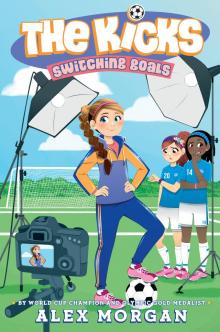 Switching Goals
Switching Goals Tandem
Tandem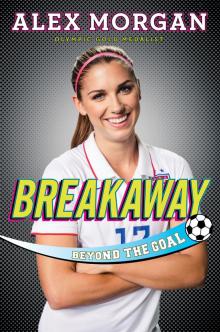 Breakaway
Breakaway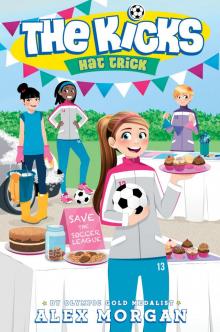 Hat Trick
Hat Trick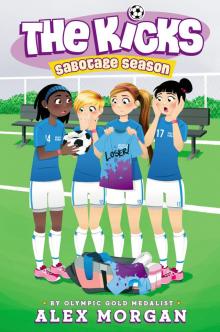 Sabotage Season
Sabotage Season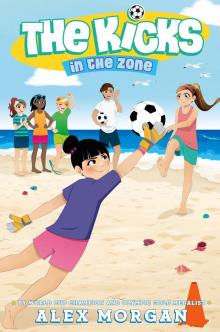 In the Zone
In the Zone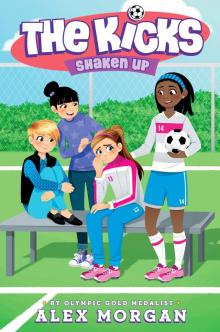 Shaken Up
Shaken Up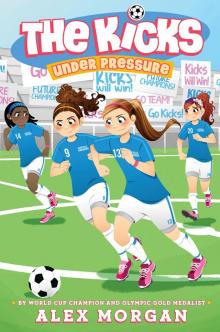 Under Pressure
Under Pressure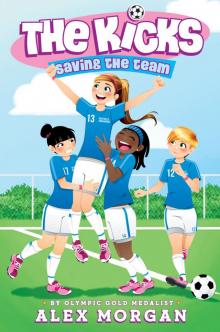 Saving the Team
Saving the Team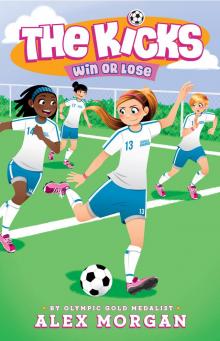 Win or Lose
Win or Lose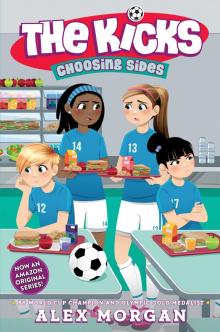 Choosing Sides
Choosing Sides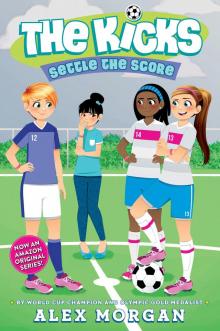 Settle the Score
Settle the Score